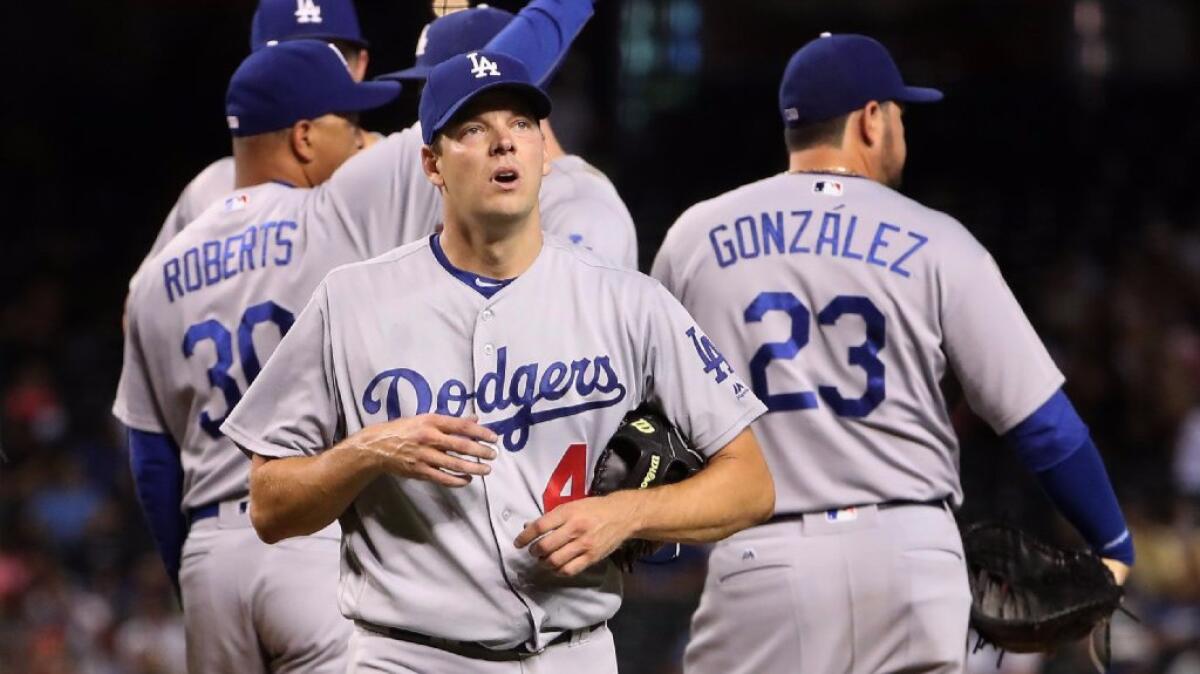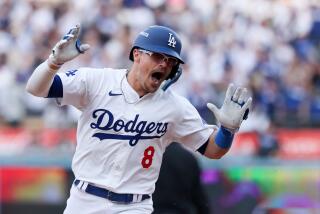Rich Hill is less than perfect in Dodgers’ loss to the Diamondbacks, 7-3

- Share via
Reporting from PHOENIX — A few steps down the line, after a fifth-inning pitch from Arizona starter Archie Bradley veered farther inside than Rich Hill preferred, Hill started to shout. When he reached first base, he spun and pointed at Bradley. His mouth unleashed a brief volley of invective, enough sound to empty both benches and bullpens, enough fury to reveal what he calls his “relentless intensity” on the diamond.
“I bring it every day,” Hill said. “And I’ll keep bringing it.”
In a 7-3 defeat to Arizona that cut the Dodgers’ NL West lead to four games, Hill could not reprise the heights of his last outing, when his seven perfect innings, and the subsequent hook from Manager Dave Roberts, inspired an industrywide debate. Five days later, the Diamondbacks taxed him for four runs in 5 1/3 innings.
The game combusted in the sixth. Down two runs, Hill gave up an RBI single, and Louis Coleman allowed his inherited runner to score. Then Coleman surrendered a three-run homer to outfielder Mitch Haniger, assuring Hill (3-1, 1.48 earned-run average) of his first loss for the Dodgers (82-64).
Despite the setback, the team can still plan for a postseason run with Hill near its center. His expression on the mound evokes melancholy. His artistry approaches the sublime. His philosophy relies upon conviction in his ability and passion in his approach.
“He’s got a lot of edge out there,” Dodgers ace Clayton Kershaw said. “It’s fun to watch. He wants to be out there. He wants to compete. And he’s really, really good.”
His journey to this moment, when Hill is one of the best pitchers in baseball, encompasses a decade of life and loss. Hill debuted with the Cubs at 25, underwent shoulder surgery at 29 and needed elbow reconstruction at 31. He has pitched for 10 teams in the last eight years. He lost his command as a starter, experimented as a reliever and chose to pitch in independent baseball last summer.
Hill was not a Long Island Duck for long. He made four starts for Boston last September, which enticed Oakland to sign him to a $6-million contract during the winter. The Dodgers targeted Hill throughout this summer, and acquired him Aug. 1 along with outfielder Josh Reddick.
“I’m trying to make the most of my time,” Hill said earlier this week, in a quiet moment during a hectic few days at Yankee Stadium. “Because time is so fleeting. You can’t buy more of it. You can’t get it back. So you have to make the most of it when you have it.”
Hill savors the incremental gifts of his profession. He lacks hobbies, he says, “except for really trying to focus on executing each pitch in each outing.” He simmers into a borderline rage on the mound, smashing a bat when Roberts removed him in Miami, jawing with Bradley on Thursday. He revels in the feeling of the baseball in his fingers, the crowd humming around him.
He understands how baseball can wound a man. He understands how life can.
His wife gave birth to their second son, a boy named Brooks, on the day after Christmas in 2013. The child dealt with health issues, and died that March. “He taught us a lot of things,” Hill told reporters that spring, and earlier this week he spoke of Brooks’ passing as a moment that crystallized his mind-set.
“For me, that’s something that speaks to how important time is,” Hill said. “And taking advantage of the time that you have here, while we’re here, to do what we do. And try to make an impact during that time.”
In the summer of 2015, Hill negotiated his release from the Washington Nationals’ triple-A affiliate and went to the Atlantic League to stretch out his arm. He wanted to try again as a starter. He reunited with Boston in August, where a conversation with Red Sox pitching guru Brian Bannister sparked his curiosity and reshaped his trajectory.
Bannister told Hill how Kershaw manipulated his off-speed pitches and how Zack Greinke altered his changeup. The discussion lit a bulb. Hill no longer needed to view his curveball as a secondary pitch.
He combines his aptitude on the mound with that smoldering intensity. At times, like in Thursday’s fifth inning, the energy manifests as anger. Hill does not offer much resistance at the plate. Before his Dodgers debut last month, he had not taken an at-bat since 2009.
To lead off the fifth, Hill squared up to bunt. Bradley fired a pitch that veered inside and connected with Hill’s left index finger, the same one that has been hampered by a blister for months. As Hill yelled at Bradley, Roberts raced onto the field. The rest of both rosters followed.
“In the heat of the moment, I think Richie took exception,” Roberts said. “But there probably wasn’t any intent there.”
Hill did not want to dwell on the moment. He acknowledged his anger at the location of the pitch. He insisted his finger felt fine. He intended to move on, to the next moment, rather than dwell on the past.
“There was no ill will, or anything like that,” Hill said. “I’m just competitive, and got excited.”
Follow Andy McCullough on Twitter @McCulloughTimes
More to Read
Are you a true-blue fan?
Get our Dodgers Dugout newsletter for insights, news and much more.
You may occasionally receive promotional content from the Los Angeles Times.










